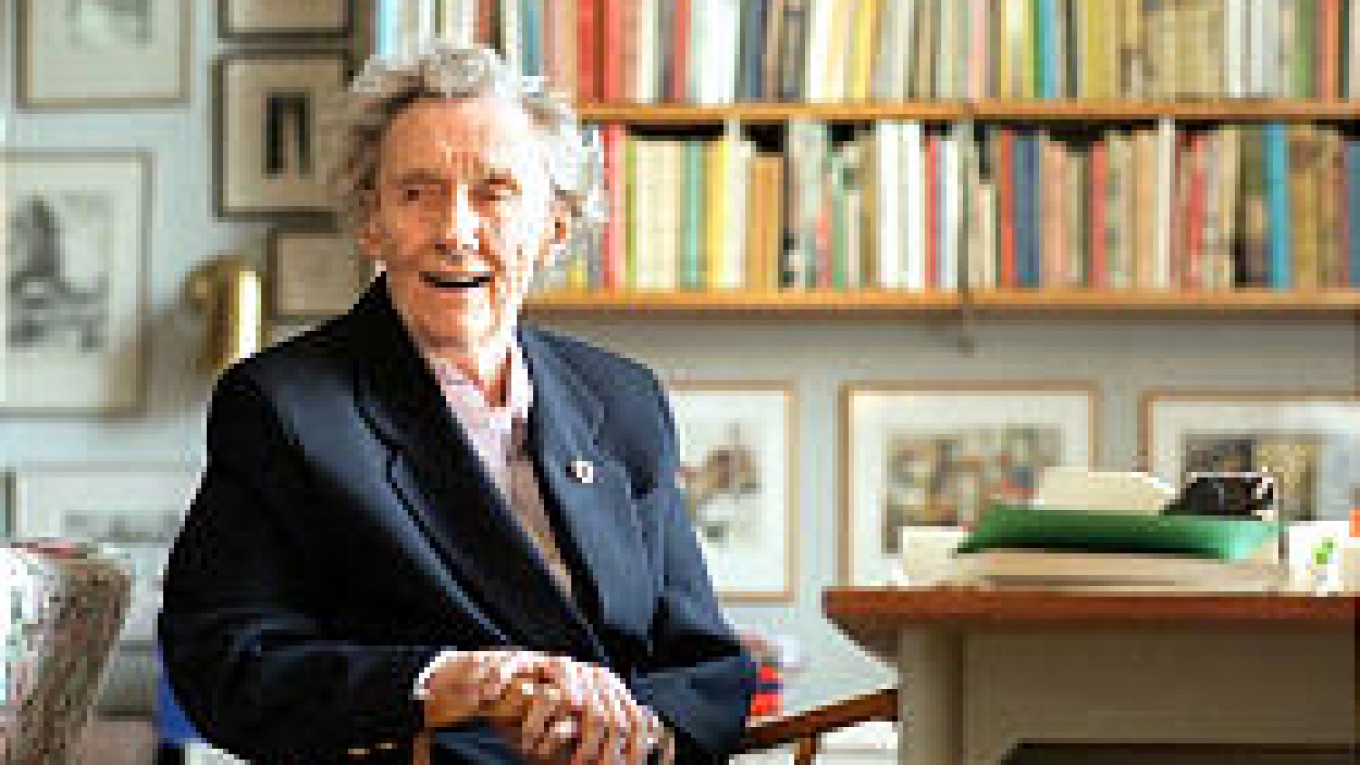Her popularity here is evidenced in the myriad newspaper front-page stories and editorials that appeared in the press this week, paying a country's final respects to a woman whose books were loved by several generations of Russian children and adults.
But while Lindgren, who was 94, was best known all over the world for creating the braided, freethinking Pippi Longstocking, or Pippi Dlinnichulok in Russian, her character Karlsson-on-the-Roof achieved much greater fame in the countries of the former Soviet Union.
Karlsson, a portly, charming little man with a propeller on his back who describes himself as "handsome, remarkably wise and just plump enough," was the star of Soviet films, plays, cartoon strips, books and jokes, and remains a popular hero to this day, despite that Lindgren wrote just three books about him: 1955's "Karlsson-on-the-Roof," 1962's "Karlsson Flies Again" and 1968's "Karlsson-on-the-Roof Is Sneaking Around Again."
"Freed from the captivity of the Swedish state of mind, Karlsson found his real motherland here," cultural commentator Yelena Kurlyandseva wrote in an essay dedicated to the Karlsson phenomenon in online publication Russky Zhurnal in 1998.
"Entire generations of Russians began to become familiar with outside realities through Karlsson, because he didn't live in the woods like Christopher Robin, but in a modern town.
"Karlsson hit the Iron Curtain with his propeller," she continued.
In Lindgren's story, Karlsson lives on the roof of a Stockholm apartment and makes friends with a lonely child called Midge (in the Russian versions, he is Malysh, or the Little Boy). The story was first translated into Russian by Lilyanna Lungina.
Lungina, mother of the filmmaker Pavel Lungin, completed the most oft-used translation of Karlsson. Her version was the basis for most of the plays based on the story that were written and staged all over the country.
The best known of these -- the musical, "Karlsson and the Little Boy" -- is still running at Moscow's Satire Theater, where cinematic and theatrical actor Spartak Mishulin has played the lead role for 33 years.
"Karlsson is a child's dream made real. They invent those dreams when they're bored," Mishulin, 75, said in a recent interview with daily Komsomolskaya Pravda.
But while Mishulin is beloved by generations of Muscovites for his portrayal of the flying Swede, the actor said that he and his character have been criticized for having too much influence over children. Those critics praise, however, another Karlsson character, the little boy's super-strict nanny, Freken Bok, who despises Karlsson and tries to keep him from her charge.
"They felt that children need discipline," Mishulin said.
Despite her sternness, the character of Freken Bok -- with her voice provided by the late actress Faina Ranevskaya -- was an audience favorite in the 1970s, when the animated films "Karlsson and the Little Boy" (Malysh i Karlsson) and "Karlsson Returns" (Karlsson Vernulsya) were released here.
"We were looking for someone to play Freken Bok for a long time and then I proposed Ranevskaya, who turned out so well," said Anatoly Savchenko, the cartoonist who created the images of Karlsson and several other characters in the films, which were directed by the late director Boris Stepantsov.
In the films, Karlsson's voice was provided by actor Vasily Livanov, best known for playing Sherlock Holmes in the Soviet films based on the Arthur Conan Doyle series.
Savchenko said that he often comes across the Karlsson cartoons when they are aired on television and is always proud of his work. According to Savchenko, Lindgren, who came to Moscow in the 1970s, "liked our work a lot."
Despite that, in today's Russia, Harry Potter and Pokemon have moved into Karlsson's territory, the Karlsson books -- called in Russian "Three Books About the Little Boy and Karlsson" (Tri Povesti o Malyshe i Karlssona) -- are still popular. In fact, the city's most central book shop, Moskva on Tverskaya Ulitsa, cannot keep up with demand.
Meanwhile, Karlsson's popularity refuses to wane, with new jokes about the fictional hero overpowering New Russians and traffic cops emerging all the time.
"Have you heard about Karlsson who lives on the roof?" goes one.
"Yes, but now he lives under the roof!" is the answer, a clear reference to the slang meaning of the word "roof," or "krysha," body guards who keep gangsters and businessmen safe from harm.
Krysha or no, flamboyant pop singer Vitas sings a song about Karlsson, painting him in tragic colors as a lonely, homeless invalid. But this indignity didn't stop MTV Russia two years ago from holding an essay competition for viewers based on the Karlsson story. The grand prize was a trip to the character's hometown, Stockholm, for the Eurovision Song Contest.
Hundreds of entries were received, some of which were highly emotional.
"It was evidence that Karlsson is still alive in people's minds," said MTV spokeswoman Natalya Sotnikova.
"Karlsson and the Little Boy" (Karlsson i Malysh) plays at noon on Saturday and Sunday at the Satire Theater, located at 2 Triumfalnaya Ploshchad. Metro Mayakovskaya. Tel. 299-6305.
A Message from The Moscow Times:
Dear readers,
We are facing unprecedented challenges. Russia's Prosecutor General's Office has designated The Moscow Times as an "undesirable" organization, criminalizing our work and putting our staff at risk of prosecution. This follows our earlier unjust labeling as a "foreign agent."
These actions are direct attempts to silence independent journalism in Russia. The authorities claim our work "discredits the decisions of the Russian leadership." We see things differently: we strive to provide accurate, unbiased reporting on Russia.
We, the journalists of The Moscow Times, refuse to be silenced. But to continue our work, we need your help.
Your support, no matter how small, makes a world of difference. If you can, please support us monthly starting from just $2. It's quick to set up, and every contribution makes a significant impact.
By supporting The Moscow Times, you're defending open, independent journalism in the face of repression. Thank you for standing with us.
Remind me later.


